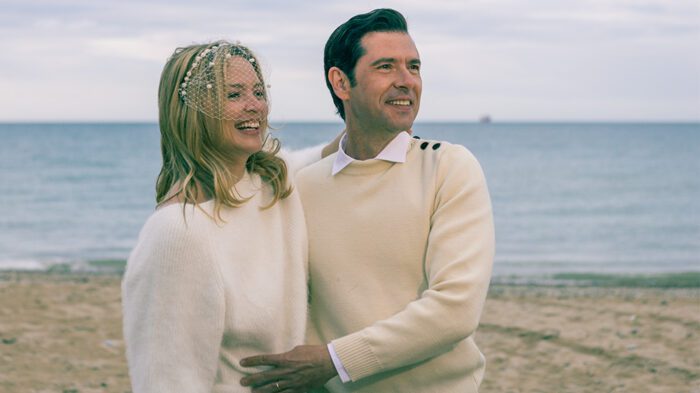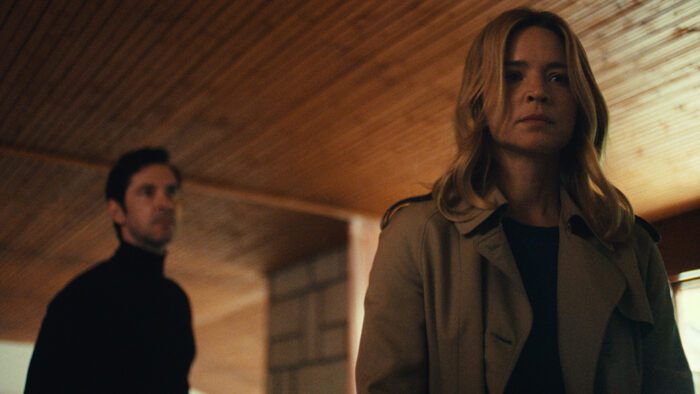Just the Two of Us, an expertly acted if somewhat subdued French domestic thriller-of-sorts, may lack the melodramatic flair of many films like it. What it does have, though, that only some films do, is Virginie Efira, the renowned Belgian actress who can elevate pedestrian fare with her ability and charisma. And here, Just the Two of Us employs Efira times two, as she plays a double role—twins separated by circumstance and distance but still sharing a deep bond. Rather than wallow in the mire of the thriller genre’s tired tropes, Just the Two of Us lets Efira do her magic as the film’s protagonist, a sister-turned-bride-and-mother who becomes the victim of an abuser’s casebook methodology.
Debuting at Cannes and then released in France last year as L’Amour et Les Forêts (“Love and Forests”), the title of the 2014 novel by Éric Reinhardt from which it is loosely adapted, Just the Two of Us takes an audacious gamble with its script, one which won the 2024 César Award for Best Adapted Screenplay (for director Valérie Donzelli and co-writer Audrey Diwan). For the film, Donzelli and Diwan create the double role of twins expressly for Efira. One twin, Rose—distinguished primarily by her bangs and her carefree manner—drags the other, reluctant literature teacher Blanche, to a party. (Blanche narrates this story to an older, professional woman in an anonymous office setting.) There, Blanche meets a handsome, charismatic businessman, Grégoire (Melvil Poupaud), whom she recognizes from her past, and the two begin a credibly passionate affair. He recites poetry, is attentive to her (ahem) needs, and seems, on the surface, an ideal lover.

Rose has reservations, but Blanche and Grégoire make little note and indulge headlong in their romance. Before long, they are married and relocated far from Blanche’s sister and mother, her now working a bit below her level in an elementary school—and finding her husband ever-so-incrementally tightening the coils around her with his insecurities. What Just the Two of Us does so, so well is to illustrate how closely charm and abuse can be related. Poupad’s Grégoire is debonair and handsome, full of spark and attentiveness, but when his self-doubt kicks in, he slowly reveals himself as a gaslighting, controlling abuser. He cuts off Blanche’s circle of friends, monitors her whereabouts, accuses her (if not inaccurately) of indiscretions, and pleads for forgiveness—then repeats the cycle in an ever-tightening concentric spiral.
Perhaps it is only American viewers, so accustomed to Hollywoodized treatments of twindom, that will find this Just the Two of Us‘s earnestness a little underwhelming. The tropes—clichés, really— of twins in film so often feature one substituting for the other in an elaborate ruse or decoy, one having assumed the other’s identity all along, or one concocting an evil plan to become the other. We’re conditioned to expect one or the other the second a twin is introduced onscreen. So it may be hard to resist imagining all the ways in which Blanche and Rose’s twin-ness will resolve Grégoire’s escalating abuse in a climactic showdown, perhaps one borrowed from a “woman-in-peril” exploitation thriller like Sleeping with the Enemy, a ’90s potboiler with which this film’s plot shares some fabric.
But Just the Two of Us will have none of that. In fact, the adapted screenplay makes surprisingly little of the topic of being twins. Rose and Blanche love and support each other, and although there exists the occasional hint that an identity switch might, just might come into play, Just the Two of Us plays this aspect of its script entirely straight. Save for not being able to double-cast the magnificent Efira, the character of Rose, with much less screen time in comparison, might have easily been a non-twin sibling or good friend. If anything, the role exists to give Blanche a foil (hardly necessary) and to endorse the conclusion’s theme of the importance of sisterhood (in the figurative sense, and more so).
As Blanche, Efira is as usual impressive and convincing. She can convey a range of expressions by darting her eyes, furrowing her brow, pursing her lip, or widening her expression. She’s given to play chaste, alluring, modest, infatuated, infuriated, trapped, frightened, aroused, intimidated, and resolute by turns and is never less than absolutely convincing. She may be Belgian, but she is simply a national treasure of French cinema. Her Rose character has much less to do (and an overtly less attractive wig to distinguish her from Blanche), with no discernible character traits except in opposition to or support for her twin. Far be it from me to doubt the wisdom of the César voters, but aside from the gimmick of double-casting Efira—who is certainly good enough, as she is in her César-winning turn in Revoir Paris and Madeleine Collins and as she always is—the notion of Blanche even having a twin means little to the film’s method or meaning.
The stylish Poupaud (One Fine Morning, Jeanne du Barry) makes for an excellent and entirely plausible villain as Grégoire. More important than his charm or looks, though, is his method. One need not be movie-star handsome like Poupard to employ the abuser’s trademarked playbook, just as the all-too-common tale of domestic abuse is hardly limited to filmic, fictional narratives. His character stealthily stakes out a set of boundaries for his spouse not to cross, then cries when she does, claiming himself to be the victim. That a competent, beautiful professional woman like Blanche can fall victim to the abuse of a man like Grégoire is simply a sad reality, an indication of just how commonplace evil like his can be.

As excellent as Efira and Poupard are in their respective roles, Just the Two of Us feels a little less confident in its overall execution. It largely wastes Efira in the double role—her Rose is more a distraction than a revelation—and spends most of its second act teasing a thriller that never fully materializes. It’s as if its makers realized they were veering, with the double-casting gimmick and the secrets-and-surveillance scenes, a little too close to potboiler territory, and eased off the pedal, opting instead for a more plausible, if ultimately mundane, conclusion. That’s no knock: Just the Two of Us is a far more insightful film about domestic abuse and its perpetrators—and victims—than most thrillers could ever aspire to be.




